Chinese banks have rolled over at least three-quarters of all loans to local governments that were due to mature by the end of 2012, an indication of the immense challenge facing China in working down its debt load.
Local governments borrowed heavily from banks to fuel China's stimulus program during the global financial crisis and are now struggling to generate the revenue to pay them back, a shortfall that could cast a shadow over Chinese economic growth.
Banks extended at least Rmb3 trillion ($482 billion) – and perhaps more – of the roughly Rmb4 trillion in loans plus interest that local governments were to have paid them by the end of last year, according to Financial Times calculations based on official data.
(Read More: China's Growth Speeds Up, but for How Long?)
The calculations are imprecise because the Chinese bank regulator only announces figures for total outstanding loans to local governments, and does not publish details about interest payments or refinancing arrangements.
Nevertheless, three separate economists said the numbers confirmed that Chinese banks had implemented rollovers on a massive scale to stave off defaults.
"That's a correct observation and explanation," said Stanley Li, a banking analyst with Mirae Asset Securities. "Based on the payback period for the infrastructure projects [started by local governments], it will take more than 10 years to pay these loans back."
Huang Yiping, an economist with Barclays, agreed: "Rollovers were really the only option available to the government and to the banks. What can you do when three-year bank loans mature while the highway is still being built?"
Ken Peng with BNP Paribas said: "Rollovers have been the common practice and this is an indication of that."
Concerns about China's indebtedness have faded in recent months as the economy has rebounded, but many analysts expect growth to slow again later this year, a potential trigger for renewed worries.
(Read More: China's Rebound Powered by 'Risky' Sectors)
Shang Fulin, China's top bank regulator, said total outstanding loans to local governments were Rmb9.2 trillion at the end of 2012, according to reports in local media on Tuesday. At the end of 2010 such loans had reached Rmb9.1 trillion.
In the intervening two years, 41 per cent of all local government debts had been scheduled to mature, according to the national audit office. Moreover, Beijing had effectively blocked all new lending to local governments.
The implication of a stable outstanding loan volume is that the vast majority of local government loans that were to come due over the past two years have simply been extended. Accounting for interest payments of 6 per cent a year, local governments have paid back a maximum of about Rmb1 trillion.


